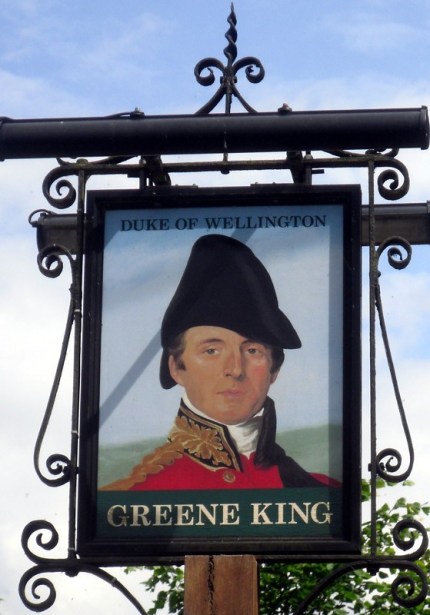The Honourable Arthur Wesley would be a terrible name for a pub and so it is fortunate that the boy born in Dublin (perhaps in what is now the Merrion Hotel) in 1769 grew up to be the 1st Duke of Wellington.
His father, Garret Wesley, 1st Earl of Mornington, died in 1781; the year that Arthur went to school at Eton, where he proved to be quite spectacularly mediocre. He is often quoted as saying that Waterloo was won on the playing fields of Eton but he loathed his time there and left in 1784; finishing his education at the French Royal Academy of Equitation in Angers, making it far more accurate to think of the Battle of Waterloo as having been won in the manèges of North-western France.
On his return to England his eldest brother, Richard, assisted him in gaining a commission in the Army. In March 1787 he joined the 73rd Regiment of Foot and was assigned as aide-de-camp to the new Lord Lieutenant, Lord Buckingham.
He transferred to the Light Dragoons two years later and also became Member of Parliament for Trim in the Irish House of Commons at the age of just twenty.
It was common practice in many European armies throughout the eighteenth century for officers to purchase commissions and promotions and, in 1793 Captain Arthur Wesley borrowed money from his brother to become first a Major and then, soon afterwards, a Lieutenant Colonel in the 33rd Regiment, with whom he first saw battle and rose to successful commands.
Towards the end of the century the family name transformed into Wellesley.
To “meet your Waterloo” suggests defeat and, indeed, it is true that the battle which took place near Waterloo on Sunday 18th June 1815 saw the end of the reign of Emperor Napoleon. It is also true that the battle brought great fame and riches to the victors, most notably the Duke Of Wellington who commanded the Allied armies alongside the Prussian armies of Gebhard von Blücher, but at what price?
Waterloo cost Wellington around 15,000 dead or wounded and Blücher some 7,000. On the morning of 22nd June Major W.E. Frye visited “the field of battle, which is a little beyond the village of Waterloo, on the plateau of Mont-Saint-Jean; but on arrival there the sight was too horrible to behold. I felt sick in the stomach and was obliged to return. The multitude of carcasses, the heaps of wounded men with mangled limbs unable to move, and perishing from not having their wounds dressed or from hunger, as the Allies were, of course, obliged to take their surgeons and waggons with them, formed a spectacle I shall never forget. The wounded, both of the Allies and the French, remain in an equally deplorable state.”
Napoleon had lost 25,000 dead or wounded, another 8,000 were taken prisoner. Perhaps this was the price that had to be paid for nearly half a century of peace in Europe.
Another long lasting legacy of the battle was the British Grenadier Guards.
Grenades (the name coming from the Spanish Granado, meaning pomegranate) were first used in sieges during the fifteenth century and the role of grenadier emerged as a distinct job, with the strongest soldiers selected to throw grenades during assaults on fortified settlements. With the changes in warfare over the centuries the role died but the name lived on for elite troops in many armies – with countries such as France and Argentina establishing elite units of Horse Grenadiers; most notably at Waterloo, the Horse Grenadiers of Napoleon’s Imperial Guard.
In the battle the First Regiment of Foot Guards defeated Le Chasseurs de la Garde and were thought to have defeated the Grenadiers; so were given the title Grenadier Guards and adopted the French bearskins by mistake.
Following his defining moment at Waterloo he again entered politics; finally becoming Prime Minister in 1828.
He became known as the “Iron Duke” due to the iron shutters which he had installed at his residence, Apsley House (he had refused to live at 10 Downing Street as it was too small) after damage was caused by those protesting about his opposition to parliamentary reform. Wellington’s Tory government fell in 1830 and when they returned to power in 1834 he declined the office of Prime Minister, which went to Robert Peel.
